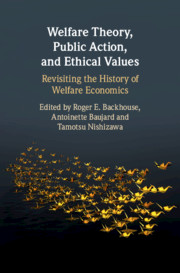Book contents
- Welfare Theory, Public Action, and Ethical Values
- Welfare Theory, Public Action, and Ethical Values
- Copyright page
- Contents
- Figures and Tables
- Contributors
- Acknowledgements
- Introduction: Revisiting the History of Welfare Economics
- Part I Plurality of Welfare in the Making of Welfare Economics
- 1 Ruskin’s Romantic Triangle
- 2 Radicalism versus Ruskin
- 3 Alfred Marshall on Progress and Human Wellbeing
- 4 Pigou’s Welfare Economics Revisited
- 5 To Which Kind of Welfare Did Léon Walras Refer?
- 6 Value Judgement within Pareto’s Economic and Sociological Approaches to Welfare
- Part II Developing Modern Welfare Economics
- Index
- References
4 - Pigou’s Welfare Economics Revisited
A Non-welfarist and Non-utilitarian Interpretation*
from Part I - Plurality of Welfare in the Making of Welfare Economics
Published online by Cambridge University Press: 04 March 2021
- Welfare Theory, Public Action, and Ethical Values
- Welfare Theory, Public Action, and Ethical Values
- Copyright page
- Contents
- Figures and Tables
- Contributors
- Acknowledgements
- Introduction: Revisiting the History of Welfare Economics
- Part I Plurality of Welfare in the Making of Welfare Economics
- 1 Ruskin’s Romantic Triangle
- 2 Radicalism versus Ruskin
- 3 Alfred Marshall on Progress and Human Wellbeing
- 4 Pigou’s Welfare Economics Revisited
- 5 To Which Kind of Welfare Did Léon Walras Refer?
- 6 Value Judgement within Pareto’s Economic and Sociological Approaches to Welfare
- Part II Developing Modern Welfare Economics
- Index
- References
Summary
We re-examine Pigou’s ethics in welfare economics with respect to welfarist or non-welfarist (more broadly, utilitarian or non-utilitarian) concepts based on various perspectives, such as incommensurability among utility and people, basic need information approach, non-welfarist justification of the national minimum, and methodological individualism in axiology. Consequently, we could detect certain non-welfarist approaches in his welfare economics, which squarely challenges the orthodox understanding of his works. We can assert that the deviation from simple welfarism was a result of practical considerations. Furthermore, apart from the dichotomy about welfarist and non-welfarist viewpoints, we present novel assessments of Pigou’s welfare notion: a hybrid strategy for the enhancement of people’s well-being. We show that his overall welfare idea involves both subjective and objective accounts and has a three-layered welfare strategy: bare and raw preferences turn into educated and refined ones via objective needs.
Keywords
- Type
- Chapter
- Information
- Welfare Theory, Public Action, and Ethical ValuesRevisiting the History of Welfare Economics, pp. 97 - 117Publisher: Cambridge University PressPrint publication year: 2021

